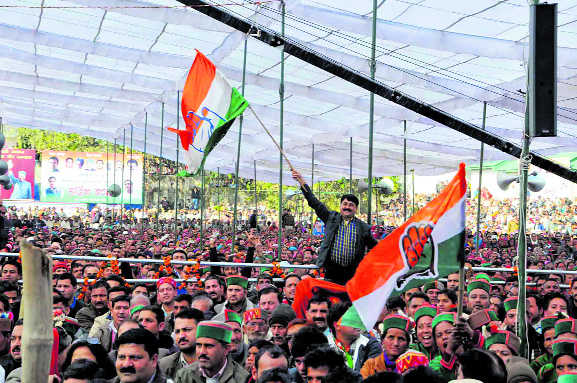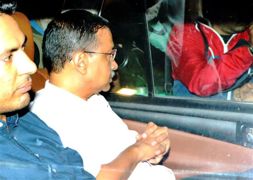
The citizens must know the candidates’ antecedents. An election rally in Hamirpur.
Sushant Chandra
THE recent recommendation by the Election Commission of India to amend the Representation of People's Act, 1951 for disclosing the details of anonymous donations in excess of Rs 20,000 has created hysteria among the political parties. The present discourse on accountability of anonymous donations made to political parties is guided by Section 29C of the Representation of People's Act, 1951. This mandates political parties to provide details of anonymous donations made in excess of Rs 20,000 in order to claim 100 per cent tax exemption.
A joint report was prepared by the Association for Democratic Reforms and Election Watch accounting for donations received by political parties for the financial year 2012-13. The report noted that only 99.14 crore out of 991.20 crore were received through donations above Rs 20,000 for the financial year 2012-13. The majority of donations were anonymous and unaccounted.
The Law Commission of India, through its reports in 1999 and 2015 proposed to entrench democratic ideals within political parties to ensure greater accountability in their functioning. The 2015 report also proposed the corporate donations paid to political parties to be approved in the annual general meeting of the shareholders and not by the board of directors. Accountability assumes greater significance, especially when anonymous donations influence the decisions of the Centre and state governments.
A complaint was filed before the National Information Commission in 2011, seeking a declaration to rope in political parties within the ambit of the Right to Information Act, 2005. The complaint argued for subsuming political parties within Section 2(h) (ii) of the RTI Act, 2005. It enables even a non-governmental organisation to be a public authority if it is substantially financed, directly or indirectly by funds provided by appropriate government. The complaint articulated the reasons for bringing in political parties under the RTI Act, 2005. The lands granted to prominent political parties in the heart of New Delhi at paltry rentals and exemption of hundreds of crores worth tax were prominent reasons amongst others.
The National Information Commission in 2013 upheld this functional test and ruled that subsidies, tax exemptions and cheap land for offices amounted to substantial indirect funding by the government and declared political parties as public authorities under Section 2(h)(ii). This order was kept at bay by all six political parties against whom the order was passed, including the INC and the BJP, and was persistently flouted by them. This advertent flouting led to filing of another complaint in 2015 wherein the National Information Commission reiterated its previous order — declaring all six political parties — as public authorities. The Commission expressed its inability to enforce the order and lamented the absence of all six political parties throughout the proceedings. It observed that no useful purpose will be served by fixing another date.
The lack of adequate sanctions in enforcing the orders of National Information Commission has rendered it a toothless tiger. It is this which has disabled the National Commission to safeguard values of propriety required for smoother functioning of electoral process. To win the coup against corruption, the state must exhibit sincerity in marshalling its forces. The National Information Commission expressed concern over the willful non-compliance of its orders and the need to identify the legal gaps and lacunae in the implementation mechanism. The lack of fairness as a political virtue is more dangerous than myriad failed attempts of its dispossession. This shows our vulnerability as a society, unwilling to learn from past mistakes, and brazenness to continue with same without bothering about democratic ideals.
Since the days of Indira Gandhi, the Supreme Court has avowedly asserted on having an open government with few secrets. In S.P. Gupta (1981), the Supreme Court implored the country to delve over the reason for this as: “If secrecy were to be observed in the functioning of government and the processes of government were to be kept hidden from public scrutiny, it would tend to promote and encourage oppression, corruption and misuse or abuse of authority, for it would be shrouded in the veil of secrecy without any public accountability.”
The rationale underscoring the discourse adopted by the apex court on this is guided by principle of exercise of free choice. This choice can't be free unless it is well informed. The surest possible test to ascertain what “well informed” would mean should be any information that may affect the decisionof a voter to vote — positively or negatively, for any candidate or a political party. In the context of criminal antecedents of a few candidates, the Supreme Court in People's Union for Civil Liberties (2003) observed the same by holding that right to vote would be meaningless unless the citizens are well informed about the candidate’s antecedents. This right was already located within the larger penumbra of principle of democracy shielding liberty of speech and expression, a year before in Association for Democratic Reforms (2002). The majority of funding through anonymous sources and resistance by political parties in roping them under the Right to Information statute speaks of volatility this information may have in constructing the content of minimum information required in a democracy to exercise a well-informed choice.
Confucius once said: Only the wisest and stupidest of men never change. The government should send a strong message by adhering to the recommendation made by the Election Commission and must make donations made in excess of Rs. 2000 accountable by providing full details of the donators. The Supreme Court in Association for Democratic Reforms (2002), observed: The little man of this country would have basic elementary right to know full particulars of a candidate who is to represent him in Parliament where laws to bind his liberty and property may be enacted.
The writer is an Assistant Professor and Assistant Director, Legal Aid Clinic, Jindal Global Law School, Sonepat.



























